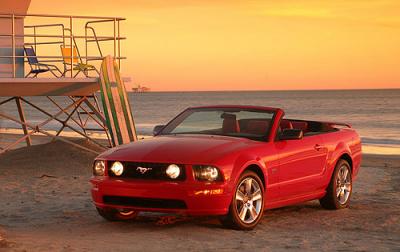Ford Mustang armed for pony car war
 The 2007 Ford Mustang has been named Most Wanted Convertible Under $35,000 by Edmunds.com editors -- the second time Mustang has won the designation.
The 2007 Ford Mustang has been named Most Wanted Convertible Under $35,000 by Edmunds.com editors -- the second time Mustang has won the designation."These are the vehicles our editorial team would chose to have in our own driveways," said Edmunds.com editor-in-chief Karl Brauer. Edmunds.com praised the Mustang's performance, retro styling and affordable price.
The Edmunds' honor is just the latest in a string of critical accolades for Mustang that, along with consumer popularity, have spurred competitors to revive their muscle cars, primarily the new Chevrolet Camaro and Dodge Challenger.
"Without the uncanny success of the Mustang, with its retro styling cues, V8 rumble, brash manner and affordable price, GM and DaimlerChrysler would surely not have bothered replaying these oldies," said Kevin Smith of Edmunds.com.
If this sounds familiar it's because automakers are reliving a scene originally played out some 40 years ago. In what auto writers dubbed the "Pony Car Wars," domestic automakers battled each other in the 1960s and early 1970s to see which company could create the most popular American muscle car.
"We embrace the Pony wars," said James Owens, Mustang marketing manager. "Mustang is the authentic American muscle car. In fact, Mustang is the only one of the original pony cars from the 1960s to live on into the 21 st century with no interruption in production."
In the wake of the Mustang's success in 1964, competing automakers set about developing products to challenge Ford's pony car – the Plymouth Barracuda, the Camaro and Firebird, the American Motors Javelin and the Dodge Challenger.
Times changed, however, and growing concerns over safety, fuel efficiency, environmental issues and insurance costs in the 1970s and 1980s diminished interest in muscle cars.
By 2002, when production of the Camaro ceased, all Mustang rivals had disappeared from the marketplace. Then, in 2004, Ford introduced a Mustang redesign embraced by auto writers and consumers.
"The 2007 Ford Mustang represents a deft blend of classic American muscle car styling cues and modern design," wrote the editors of Edmunds.com "Whether you choose a V6 or V8, a coupe or convertible, this is one of the best values on the market for consumers seeking traditional rear-wheel-drive performance."
One reason for Mustang''s longevity is the car's appeal to a wide range of car buyers.
"Mustang has two kinds of buyers," Owens said. "People under 40 and people over 40. That sounds like a joke, but its true. Our target customer "Drew" is a younger person who likes the Mustang because its basically cool. But our consumption customer is the baby boomer, who no longer needs a Mini van or SUV and who fondly remembers the Mustang of their youth."
While neither competitor is in production yet, the Chevy Camaro concept made a stir at the 2006 North American International Auto Show. The production model is expected to be a coupe and reach showrooms during the first quarter of 2009. Specific details are unknown at this point, but GM indicates the Camaro will be offered in a variety of models with a choice of manual and automatic transmissions and V-6 and V-8 engines.
Daimler/Chrysler will debut its new Dodge Challenger in 2009. Details are even scarcer than for Camaro, but a Hemi engine is a good bet.
In another flashback, Ford announced it is reviving the legendary 5.0-liter 302 cubic inch V-8 engine for the aftermarket with a new line of BOSS 302 crate engines, which will go on sale in early 2007. Making its debut in 1969, the original BOSS 302 powered a limited production Mustang model sold for two years, which was known as the BOSS 302. The new line of BOSS crate engines will deliver up to 500 horsepower.
Despite challenges, Mustang's production streak looks destined to continue with sales up more than 30 percent in September 2006 compared with the same period in 2005. Mark Fields, executive vice president and president-The Americas, announced in September that at least one new Mustang variation would be introduced every year.